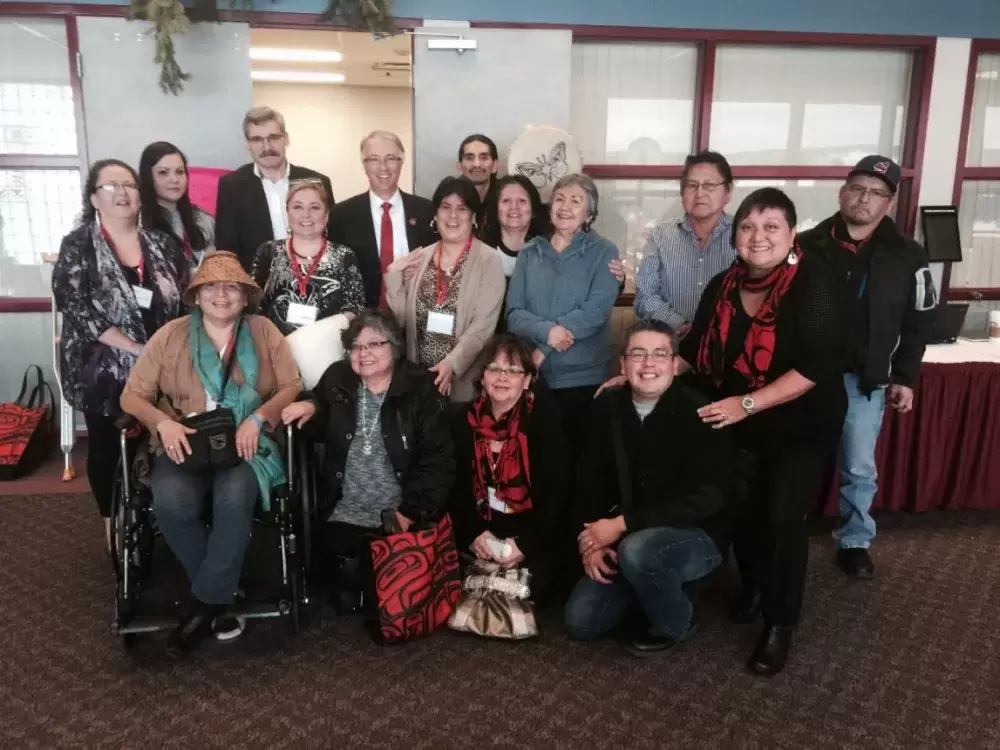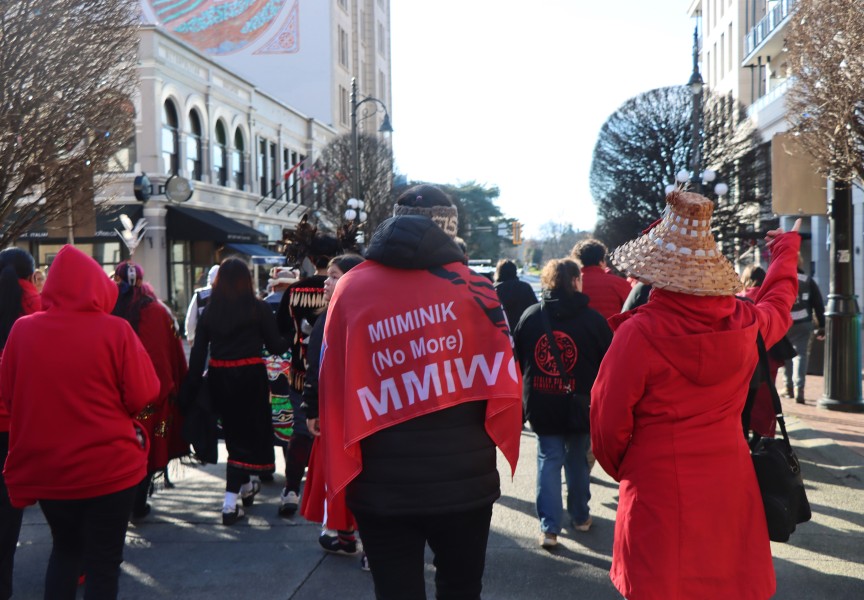“I believe that proverb, “a people are not defeated until the hearts of its women are on the ground.” Let me tell you when we come together, regardless of any of the hurts we’ve been through, when we decide to fight for what is right, when we decide to fight for our loved ones, when we decide to become the voice for the ones we’ve lost, our hearts will never be on the ground. They will always be in the air. We will have a strong heart. And that’s what’s going to make sure our nations are never defeated.” — Mary Teegee, Director Carrier-Sekani Family Services
About 20 Nuu-chah-nulth people travelled to the Lheidi T’enneh territory (Prince George) for the 2016 Provincial Family Gathering for families of murdered and missing Aboriginal women and girls. The event took place Jan. 31 to Feb. 2.
The purpose of the gathering was two-fold: to begin to bring families together for personal connection and healing, and to gather input for the national inquiry into murdered and missing Indigenous women and for the national roundtable on missing and murdered Indigenous women and girls.
A highlight of the event for Mowachaht/Muchalaht’s Lillian Howard was the Kwakwaka’wakw Mourning Ceremony and Blanketing.
“The songs were really powerful and helped me find some peace around the loss of my aunties, and like Dr. Gabor Mate said in his workshop, the ceremony was a reconnecting to culture and all that the blanketing represents, a bringing of spirit back, a bringing of a person back to community.”
One member from each family was asked to sit on stage and the stage was filled over capacity with only 110 families represented.
Seven Nuu-chah-nulth-aht, carrying a picture of their loved ones each, were among the 110 people wrapped in blankets during the ceremony.
Cheryl Casimer of the First Nations Summit Task Group, reflected that if the rest of Canada could have witnessed the packed stage they wouldn’t deny we need the national inquiry. The stage represented less than 10 per cent of the 1,200 missing and murdered Indigenous women across Canada, and the seven Nuu-chah-nulth-aht represented 11 of the missing and murdered Nuu-chah-nulth women, only a small fraction of the suspected number.
Nuu-chah-nulth Tribal Council President Deb Foxcroft echoed the feelings of many of the Nuu-chah-nulth participants. “This really opened my eyes as to how many missing and murdered Nuu-chah-nulth we have and this is only a small group.”
Foxcroft said she was committed to supporting the families of the murdered and missing Nuu-chah-nulth women with her political role.
“We counted 10 missing or murdered Nuu-chah-nulth relatives, just in a casual conversation,” said Lillian Howard. “It’s as if we are either in denial as families because the truth is too painful to acknowledge or we’ve accepted this kind of violence as normal. I know for my family, we remained in denial for many years before acknowledging what really happened to my aunties.”
During the afternoon of the first day, the families were welcomed to a three-hour workshop with Dr. Gabor Mate.
“The essence of trauma is not the terrible thing that happens. Trauma is what happens inside as a result of those terrible things…. We lose contact with who we are, with culture, nature,” he said.
Many of the “new” discoveries in science about impacts of stress, particularly the impact of stress on unborn babies, have been known in First Nations knowledge systems for hundreds of years. He said he believes connection to our First Nations wisdom will be a source of healing.
The very first step in healing from trauma, Mate said, is simply to recognize it and the second is to talk about it. He said one of the first effects of trauma is feelings of isolation, like we’re different and no one can ever understand. By telling our story we quickly learn we’re not alone, and those incorrect hurtful feelings and beliefs lose their power and fall away as they are proven wrong. It is critical that we reconnect with who we are; that we return to ourselves and even return to our bodies to continue towards healing.
The Butterflies in Spirit dance troupe provided Lillian Howard one way to reconnect with her body. The Butterflies in Spirit, a dance group made up friends and family members of murdered and missing women, was founded by Lorelei Williams to raise awareness of the situation.
“It created space for our people to bring out their creative side, and in the moment of creation, to let go a little,” she said.
On the last day of the event, Deb Foxcroft and the Nuu-chah-nulth families met with John Rustad, B.C. minister of Aboriginal Relations and Reconciliation. Foxcroft, who had agreed to speak on behalf of the families, raised key points at the families’ request.
They included a request to have the humanity of our missing and murdered loved ones recognized. That they had a role within our community and families, and they are loved and will always be missed.
They requested support to have a gathering, similar to the one in Prince George, in Nuu-chah-nulth territories where more families could be present in a safe space with our Nuu-chah-nulth culture and in recognition that there’s healing in coming together for support and telling our stories.
The group also asked the minister to support the creation of a commemorative pole or memorial wall.
They asked that cultural-sensitivity training be mandated and required for people working in the ministries, and for improved communication with the RCMP and that RCMP be given specialized training.
Minister Rustad said his government would be very open to working with the Nuu-chah-nulth on more localized initiatives and would look for communications from NTC. He also said that the creation of a specialized policing group to deal with murdered and missing Indigenous women was already being discussed in government.
Judi Lamb said, as Nuu-chah-nulth, we need to record our own statistics. She and her sister Jo-Anne Malinski shared that their family was initially told their mother died of a heart attack. They later learned that she was beaten to death and had obvious bruising and injuries from the beating. It was noted that there have been other deaths in our community that were called “natural” by one system, but were not seen that way by people who live in our communities.
Lisa Marie Young’s family spoke about a need for better communication with the RCMP, a task force specially trained to work on missing and murdered cases, and stronger penalties for violent crimes.
“We have a story in our history where a chief’s daughter was raped and that led to an entire village being massacred,” said Moses Martin. “The location of that village is where me, my wife and my daughter and her husband live today. They dealt with that kind of crime very seriously.”
Tla-o-qui-aht Tyee Hawilth Wickaninnish thanked Deb Foxcroft formally for supporting the families of the murdered and missing Indigenous women.
The Nuu-chah-nulthfamilies would also like to be sure that the event coordinator, Marcia Dawson, knows how much her work was appreciated.
Tears filled the eyes of many in the room when the men stood in commitment to reconcile with Indigenous women. Tribal Chief Terry Teegee of the Carrier Sekani Tribal Council led the commitment,
“As Indigenous men, we have a responsibility for reconciliation with our women. So I think all the Indigenous men should stand up with me to commit to our women, to our most vulnerable, that we will fight for them. That we will fight for reconciliation, that we will decolonize ourselves, that we will fight for justice for our people.
“That’s a commitment you have from me till my dying breath for my daughter. We can just simply commit to our women that we will change this relationship. That we will unlearn what has been taught and commit to our rightful place as leaders and warriors and protect our women. Thank you for standing up with me, and I really believe you have that in your heart as any Indigenous man would.”
Nuu-chah-nulth missing and murdered represented at the gathering:
Elaine Patricia Dan, Tla-o-qui-aht
Nelllie Joseph's niece, daughter to Nellie's sister Anna, was murdered in July 1982 when she was only 24 years old. Elaine's body was found on the banks of the Fraser River. Nellie's daughter, Noreen Frank, remembers Elaine spending much of her childhood with their family. "She was so full of life and had such a free-spirit," Noreen reflected, and fondly recalled spontaneous joy involving loud blasts of Elvis.
Shirley Anne Joseph and Florence Violet Joseph
They started with a family of 12 siblings, today only six are left. Their mother went to residential school and so did they: at Alberni Indian Residential School, said Bernice Touchie.
Shirley Anne Joseph was born June 4, 1956 and was murdered by her boyfriend in Duncan in August of 2013. "There was no investigation, even though there was a video from the casino of her getting kicked," said Bernice Touchie. The family has been left with many unanswered questions around the RCMP's lack of investigation and pursuit of justice for their mother. Shirley leaves behind sons Leslie Joe and Frank Jones and daughters Lisa Joe, Jolene Joe and Marcina Joe.
Florence Violet Joseph was murdered in Port Alberni in 1974.
Isabelle K. Dick (nee Francis) & her daughter Annabelle Mark, Mowachaht/Muchalaht (not pictured).
Robert Dick Jr. lost his paternal grandmother, Isabelle K. Dick, in 1978, and her daughter in 1983, both in Victoria. Isabelle's lineage is from Pacheedaht and Makah and she married into Mowachaht/Muchalaht. "Attending the gathering has not only been medicine to me and my family," shared Robert, "but has replaced my gramma's sacred identity to it's rightful place. She is no longer a statistic of MMIW."
Patricia Thomas, Ditidaht
On Dec. 15, 1985, three young Ditidaht women, Karen and Judi Thomas and Jo-Anne Malinski (nee Thomas) lost their mother at the hands of a serial killer commonly known as the "boozer-barber" in Vancouver. Their mother, Patricia Alice Thomas, was the 4th of his 22 victims. "The police failed. The media failed," said Judi. "How could he have killed so many women without being caught?" Today tears continue to flow as the sisters remember how they were initially told their mother died of a heart attack while covered in obvious wounds. Life is lightened for the sisters by Karen's daughter, Patricia Alice Thomas' namesake.
Lisa Marie Young, Tla-o-qui-aht
Lisa Marie Young's mother and father Joanne and Don Young, her auntie Carol, her grandmother Cecelia Arnet, and her grandfather Moses Martin have been left wondering, hoping and grieving since June 30, 2002. She was last seen leaving a party in the early hours of June 30, 2002. Lisa was 21 years when she went missing. Every year in June her mother and family hold a Walk of Love and Hope for Lisa in Nanaimo.
Helena (photo not available) and Christine Beatrice Howard, Mowachaht/Muchalaht
In July 1979, Harvey E. Thomas lost his mother and his auntie, his two-year old-daughter Kaiya lost her grandmother, Lillian Howard lost her two aunties and Lillian's daughter lost two grandmothers. Christine Howard, 26, and 16-year-old Helena Howard were both murdered when they were hitchhiking out of Campbell River. Lillian stated that for many years her family didn't fully acknowledge what really happened that night. It was too painful. Today, Lillian and other family members work towards letting some of the grief go and at the same time work towards to preventing the same thing from happening to any other young woman.
Other Nuu-chah-nulth missing and murdered women were represented at the event, though we have not caught up with the families yet. More information will be added when we get the materials.













